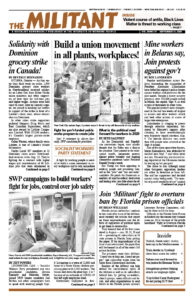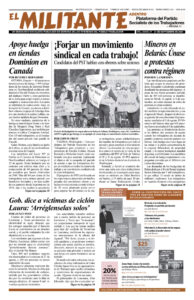Popular mobilizations across Belarus demanding the resignation of President Alexander Lukashenko have defied his regime’s police threats against workers and protesters for the past month. Despite a heavy security presence, over 100,000 people rallied in Minsk, the capital, Sept. 6, as well as tens of thousands in other cities.
The popular protests were strengthened in the last two weeks of August as miners and other workers struck and took other actions at scores of large state enterprises.
Lukashenko is clinging to power through selective repression, bolstered by Moscow’s support, after claiming to have overwhelmingly won flagrantly rigged elections Aug. 9. The interior ministry says more than 600 people were arrested at the Sept. 6 actions.
One of the main opposition figures, Maria Kolesnikova, was abducted by masked men Sept. 7 and taken away in a van. The next day, she resisted being deported at the Ukrainian border by tearing up her passport.
She chose to stay although many other bourgeois opposition leaders are either in detention or have left. She and her supporters had decided against using bodyguards. “No number of guards would be of use” against “a bus full of riot police,” she said. “We all know what a police state is capable of.”
A key strike was at the state-owned Belaruskali mines and concentrating plant, which is the world’s largest producer of potash, a major fertilizer. Members of the strike committee, nominated by workers from the different divisions of the complex, responded to emailed questions from the Militant.
The Belaruskali strikers’ demands for an end to the brutal regime were signed by 5,000 workers, reflecting “the mood of millions,” they explained. The regime’s “falsification of elections and the violence against civilians who came out to express their opinions” was what drove the strike wave. Workers didn’t “want to feed the punishers who beat, rape, maim and kill civilians for our money.”
‘Workers most effective class’
Lukashenko “is most afraid of the working class,” committee member Vitaly Dyadyuk wrote. “The people of power tell us to work as slaves and not raise our heads.” Politics, they say, “is none of our business.”
The working class is “the largest, most effective class,” Dyadyuk wrote, “because we produce the products, goods, services. We feed the country.”
The political strikes that erupted at scores of enterprises in the last two weeks of August were because Lukashenko “spat on the people’s choice,” just as he held all the previous elections in contempt. Workers didn’t want to support “the current criminal illegal government.”
“All the institutions of power work for the one criminal family,” Dyadyuk pointed out. Lukashenko, a former collective farm boss when Belarus was part of the Soviet Union, rose to power in 1994 and has stayed there since. He has used his hold on power to control “a network of large hypermarkets, construction companies, gambling and lottery businesses, and the sale of tobacco and alcoholic beverages.”
There are about 19,600 employees at the mining complex, including the massive Soligorsk mine 2,000 feet underground.
“Unfortunately, not everyone can express their protest openly and refuse to work due to pressure from the administration,” Sergei Cherkasov, co-chairman of the Belaruskali strike committee, wrote. “Therefore, many had to return to work.”
“Many people at Belaruskali support the protest but they are afraid” to strike, the committee members explained, instead strictly working to rule. There are numerous issues from the lack of proper ventilation in the mines to faulty tools, so that “people do not work or do it very slowly.”
In the Belaruskali complex as elsewhere, “labor laws are not respected” by the bosses, and “work injuries are on the rise, a huge number of accidents are hidden.”
Dyadyuk said that “the pressure on the strike committee and on those in the strike is increasing.” Police come to their homes with summonses. Their apartments and cars are searched. “Each of us can be planted with drugs, everyone can be compromised. These criminals in uniform can do anything to maintain their criminal power.”
Threats and repression have taken a toll. There are “about 50 people left on strike in a serious way,” Dyadyuk said. The committee members would like more workers to leave the official State Federation of Trade Unions and join the Belarusian Independent Trade Union.
One person, who was detained Aug. 30, was found dead in a river. The police say this was suicide but “people don’t trust this.” The battered body of another, 25-year-old Alexei Demidov, was found on the outskirts of Minsk Sept. 5.
Several leading members of the main strike committees have been detained by agents of the KGB, the Soviet-era Belarus secret police. “Those who object, who speak up,” if they can’t be intimidated, “can be taken away, imprisoned or eliminated.”
“People are scared,” Dyadyuk said. “Nevertheless, every day there are dozens of applications to join the Belarus Independent Union.” The perspective of the strike committee, he said, is for a nationwide strike, “the most peaceful, efficient, effective method to force Lukashenko and his criminal entourage to leave.”
Lukashenko looks to Moscow
As his regime holds onto power, Lukashenko has been forced to turn to Moscow for economic, political and military backing. At the end of August, in the mist of the political crisis, the government of Vladimir Putin agreed to refinance Minsk’s $1 billion debt to Moscow.
Lukashenko has a history of playing off the European imperialist powers against Moscow to try to hang onto power. Russian Prime Minister Mikhail Mishustin came to Minsk Sept. 3, with a large delegation. Lukashenko announced agreement was being reached on bringing the two countries into a closer union.
Putin has raised the threat of intervention and put together a special Russian reserve of security forces Aug. 27, while saying these will be sent only if the situation “gets out of control.” Moscow has already sent planeloads of Russian broadcasters from the state-financed RT network to replace striking staff at Belarus state TV.
The Russian president faces his own problems, including nearly two months of sizable protests in the country’s Far East over his detention in Moscow of the elected regional governor there. Some of these protesters have begun carrying signs and flags in solidarity with the Belarusian movement.
“It is no secret,” the Belaruskali strike committee members wrote, “that the majority of Russians themselves do not like Putin’s imperial ambitions and foreign and domestic policies.”
Hanna Sharko helped with translation.

